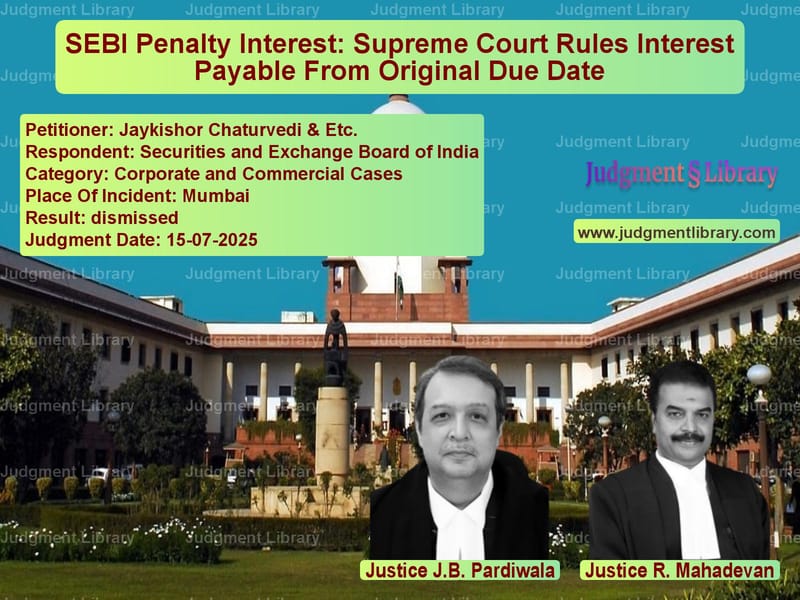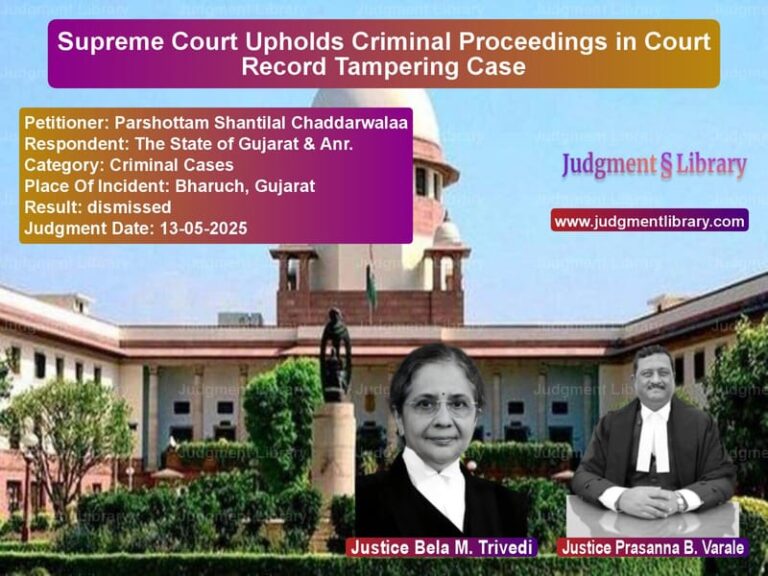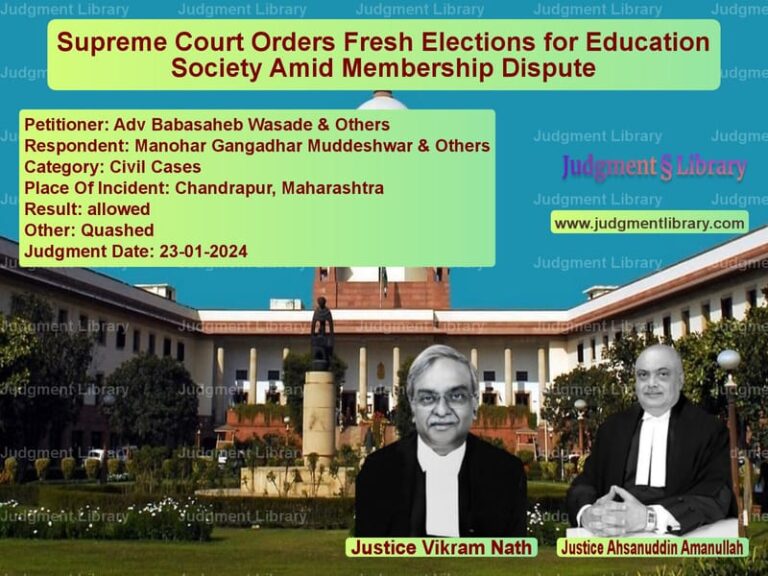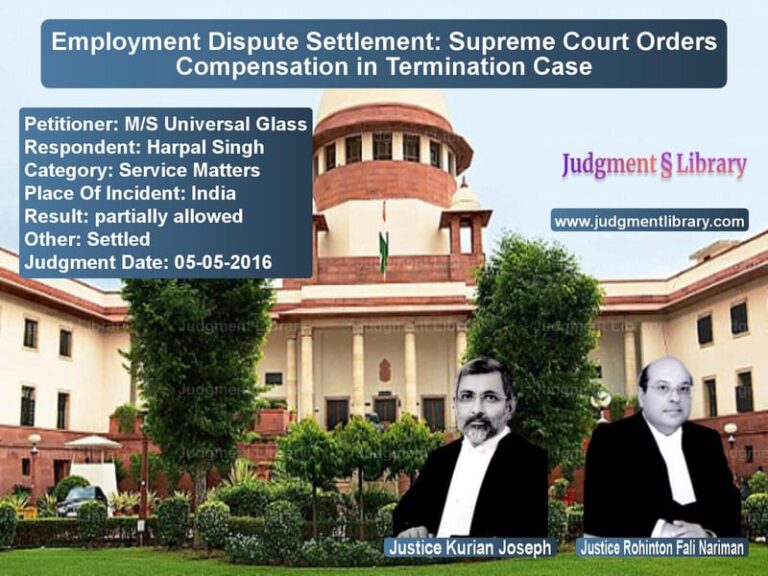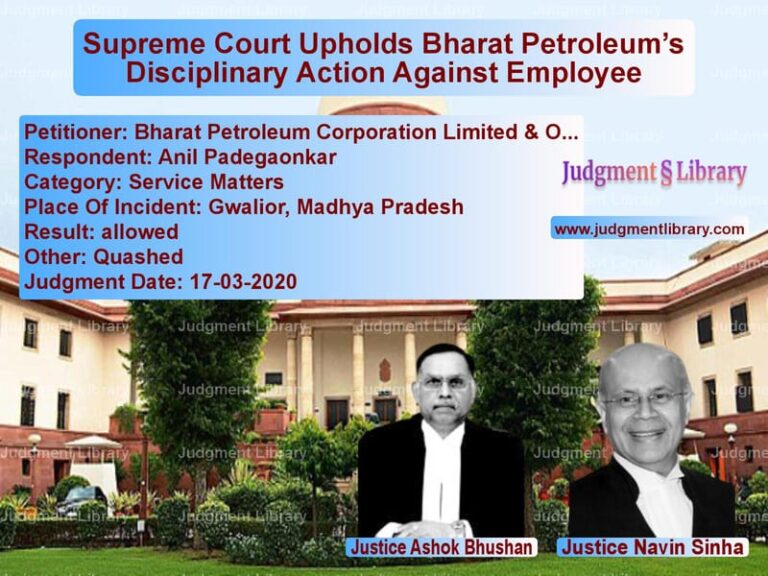SEBI Penalty Interest: Supreme Court Rules Interest Payable From Original Due Date
In a significant ruling that clarifies when interest on SEBI penalties begins to accrue, the Supreme Court has delivered a judgment that affects how financial penalties are calculated and recovered in securities market violations. The case involves three directors of Brijlaxmi Leasing and Finance Limited who found themselves facing not just penalties for insider trading violations, but substantial interest charges accumulating over nearly a decade of non-payment.
The legal journey began in 2014 when SEBI’s Adjudicating Officer imposed penalties on Jaykishor Chaturvedi, Siddharth Jaykishor Chaturvedi, and Ankur Jaykishor Chaturvedi for violations of insider trading regulations. The penalties amounted to Rs. 11,00,000, Rs. 5,00,000, and Rs. 7,00,000 respectively. These penalties were affirmed by the Securities Appellate Tribunal in 2015 and ultimately by the Supreme Court itself in 2019, making the liability final and unquestionable.
Despite the penalties attaining finality, the appellants failed to make the payments. It wasn’t until 2022 that SEBI issued formal demand notices, and even then, the payments weren’t made. This led SEBI to issue attachment notices for bank and demat accounts in June 2022. The appellants challenged these recovery proceedings, arguing that the interest calculations were excessive and that interest shouldn’t be charged from the original 2014 due date.
The Core Legal Dispute
The central issue before the Supreme Court was fundamentally about timing – when does interest on unpaid SEBI penalties actually start accumulating? The appellants argued that interest should only begin from the date of SEBI’s 2022 demand notices, while SEBI maintained that interest properly accrued from the original due date in the 2014 adjudication orders.
The appellants’ counsel presented several technical legal arguments. “The Recovery Officer of the respondent exceeded the powers vested under section 28A of the SEBI Act by imposing retrospective interest computed from the date of the original adjudication orders dated 28.08.2014 under section 15-I of the SEBI Act, despite the absence of any provision for the imposition of interest in the said order.”
They further contended that “the demand notices, in essence, amount to a rewriting of the original adjudication orders, which had already attained finality.” The appellants relied on legal principles against retrospective application of laws, arguing that “the imposition of interest is a matter of substantive law, and therefore, cannot have retrospective application.”
SEBI’s position was equally firm. Their counsel argued that “the issues involved herein are no longer res integra, having been conclusively adjudicated by this Court in Dushyant N. Dalal (supra), wherein, this Court affirmed the authority of SEBI to levy interest, including on penalty amounts, pursuant to Section 28A of the SEBI Act read with Section 220 of the Income Tax Act, 1961.”
The regulatory body maintained that “the direction issued by the Adjudicating Officer of SEBI in the adjudication orders dated 28.08.2014, requiring payment of penalties by the appellants within 45 days from the receipt of the said orders, would constitute the ‘notice of demand’ contemplated under section 156 of the Income Tax Act.”
The Supreme Court’s Analysis
The Supreme Court delved deep into the legal framework governing SEBI penalties and recovery proceedings. The Court examined Section 28A of the SEBI Act, which was inserted in 2013 and provides the mechanism for recovery of penalties. This section incorporates certain provisions of the Income Tax Act, including Section 220, which governs when tax becomes payable and when an assessee is deemed in default.
The Court made a crucial distinction in its analysis: “The SEBI Act, 1992 was primarily enacted to protect the interests of investors in securities, to promote the development and regulation of the securities market… To achieve these objects, the SEBI Board takes cognizance of offences committed by companies and their directors and initiates action by way of levying penalties.”
Addressing the heart of the dispute, the Court observed: “In the present case, although the original adjudication orders dated 28.08.2014 did not expressly mention interest, the liability to pay interest arises as a matter of law by operation of section 28A read with section 220 of the Income Tax Act.”
The Court rejected the appellants’ argument that interest should only run from the 2022 demand notices, stating: “The appellants contend that interest, if payable, should accrue only from the date of the demand notices issued on 13.05.2022, rather than from the date of the adjudication orders. Conversely, the respondent argues that interest is due from the expiry of the 45-day period following the adjudicating orders dated 28.08.2014 as those orders constituted enforceable demands.”
The Court’s Reasoning and Final Ruling
The Supreme Court provided clear reasoning for its decision, emphasizing the compensatory nature of interest rather than its punitive character. “Interest on unpaid penalties is compensatory in nature, not penal. Its primary purpose is not to punish the defaulter, but to make good the financial loss occurred to the Revenue on account of delay in receiving the payment that was lawfully due.”
The Court further elaborated: “When a penalty is imposed, a specific period is granted for compliance. If the payment is not made within that stipulated period, the delay deprives the Revenue of the timely use of funds that rightfully belong to the public exchequer. Therefore, the accrual of interest upon default is automatic and flows from the nature of the liability – serving to compensate for the time value of money and the disruption caused by delayed payment, rather than to impose an additional punitive burden.”
In its conclusive finding, the Court stated: “Thus, we hold that interest must accrue from the expiry of the 45-day compliance period following the adjudication orders dated 28.08.2014. The subsequent demand notices are nothing but reminders and are not the first demand notices before the accrual of liability for interest. Accepting the appellants’ position would encourage defaulters to delay payment indefinitely under the guise of awaiting formal orders, thereby undermining the efficacy of the enforcement framework and resulting in a loss to the revenue.”
The Court dismissed all appeals and directed the appellants to pay the calculated interest within 15 days. The ruling establishes that once a SEBI penalty order specifies a payment deadline, interest automatically begins accruing from that date if payment isn’t made, regardless of whether subsequent demand notices are issued. This decision reinforces the principle that statutory dues must be paid promptly, and delay comes with automatic financial consequences designed to compensate the public exchequer for the time value of money.
Petitioner Name: Jaykishor Chaturvedi & Etc..Respondent Name: Securities and Exchange Board of India.Judgment By: Justice J.B. Pardiwala, Justice R. Mahadevan.Place Of Incident: Mumbai.Judgment Date: 15-07-2025.Result: dismissed.
Don’t miss out on the full details! Download the complete judgment in PDF format below and gain valuable insights instantly!
Download Judgment: jaykishor-chaturvedi-vs-securities-and-excha-supreme-court-of-india-judgment-dated-15-07-2025.pdf
Directly Download Judgment: Directly download this Judgment
See all petitions in Company Law
See all petitions in Corporate Compliance
See all petitions in Fraud and Forgery
See all petitions in Debt Recovery
See all petitions in Banking Regulations
See all petitions in Judgment by J.B. Pardiwala
See all petitions in Judgment by R. Mahadevan
See all petitions in dismissed
See all petitions in supreme court of India judgments July 2025
See all petitions in 2025 judgments
See all posts in Corporate and Commercial Cases Category
See all allowed petitions in Corporate and Commercial Cases Category
See all Dismissed petitions in Corporate and Commercial Cases Category
See all partially allowed petitions in Corporate and Commercial Cases Category

